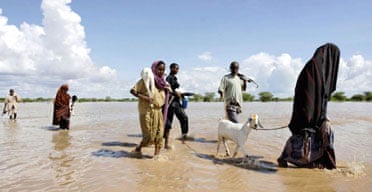In a thinly veiled attack on the US and Australia, the UN secretary general, Kofi Annan, said today that a "frightening lack of leadership" was hindering the fight against global warming.
Speaking at the start of the main session of the UN climate change conference in Nairobi, Mr Annan described the build-up of heat-trapping greenhouse gases that are raising the planet's temperature as an "all-encompassing threat" to the world.
He said that the Kyoto protocol, under which industrialised countries agreed to limit their harmful emissions to pre-1990 levels by 2012, was a key step in tackling the problem. The US and Australia refused to sign the protocol, claiming it would unfairly hurt their economies as it does not commit developing nations such as China and India to binding targets.
"If they [the US and Australia] don't sign Kyoto, they have to be in step with the rest of the industrialised world," Mr Annan said. "They have a responsibility to their citizens and to the rest of the world."
In another comment that appeared aimed firmly at the US president, George Bush, whose Republican party fared badly in last week's mid-term elections, Mr Annan called on leaders to stop being "economically defensive". "[They] must show courage and know that if they do, the people and the voters will be with them."
More than 100 environment ministers have gathered in Nairobi to try to negotiate the platform for a successor treaty to Kyoto, which expires in 2012. Environmental activists say that a new agreement will have to include the US and Australia if it is to be effective. Countries undergoing rapid industrialisation, such as China, India, Brazil and Mexico, should also agree to binding targets, even if they are less onerous, they say.
Australia, which is the world's second biggest per capita greenhouse gas polluter, has softened its stance in recent days, with the prime minister, John Howard, saying that he would consider an international carbon trading system - a key element of Kyoto - to try to slow global warming.
The US, the world's biggest carbon dioxide polluter, is showing signs of feeling the heat from campaigners. The spokesman for Republican senator James Inhofe, who heads the Senate environment and public works committee and has described global warming as a "hoax", complained at a debate yesterday that scientific debate was being suppressed. "The sceptics who get vocal are vilified," said Marc Morano, director of communications for the committee.
But few people expect the US, represented in Nairobi by Paula Dobriansky, the under-secretary for global affairs, to change its hardline stance.
John Stanton, the vice-president of the Washington-based National Environmental Trust, said: "We can anticipate that the Bush administration will continuing its destructive role in trying to sabotage progress at these talks. It will push for bilateral and voluntary agreements rather than any multilateral treaty under a mandatory UN framework."
Mr Annan said he was "encouraged" by the British climate change report issued by Sir Nicholas Stern, which warned that the economic cost of inaction on global warming would far exceed that of any short-term preventive measures. He acknowledged that nations undergoing rapid industrialisation needed to limit their harmful emissions, but although research into clean energy was "woefully, dangerously low", he said that advances in green technology meant the developing world did not have to sacrifice economic growth.
He praised China, which opens a new coal-fired power station ever week and is set to overtake the US as the world's biggest polluter within the next decade. "Rapidly growing countries like China have been increasingly successful in decoupling economic growth from energy use, thereby reducing the emission intensities of their economies," Mr Annan said.
In a report issued on Monday, the Centre for Clean Air Policy (CCAP), a US thinktank, backed up Mr Annan's comments by describing as a "myth" the view that developing countries are doing little to slow greenhouse gas emissions. Ned Helme, the president of CCAP, said that Brazil and China had taken steps to cut emissions by the same amount as the US by 2010.
In an interview with the Guardian on Monday, David Miliband, the UK's environment secretary, also stressed that China was fully aware of the dangers of global warming and was taking action. "China can see what is happening. They get it."
He said that a change in the US position on climate change would be "great legacy" for Mr Bush, and that a post-Kyoto treaty would have to be fully agreed by 2009 if it were to be effective. "International politics is moving more slowly than the science. We have still got an 'after you, Claude' situation between some industrialised and developing countries. We have to get everyone in."
